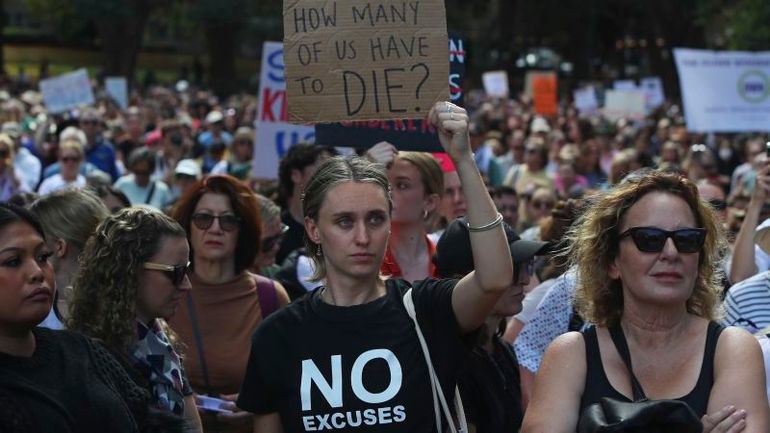
Initiative in Australian State to Address Men's Behavior Change Amid Rising Concerns on Violence Against Women

With growing concerns over domestic violence in Australia, characterized as a 'national crisis' by the Prime Minister, an Australian state introduces a new official dedicated to enhancing men's behavior. This proactive step comes as women in Australia advocate for concrete actions to tackle the escalating issue of violence against women.
Australian women are advocating for action on domestic violence, a problem labeled as a "national crisis" by the country's prime minister. In response, one state has appointed a special official tasked with improving men's behavior.
Victoria Premier Jacinta Allan revealed on Wednesday that state MP Tim Richardson has been appointed as the first Parliamentary Secretary for Men's Behavior Change in the country.
Richardson emphasized the importance of addressing the impact of the internet and social media on male attitudes towards women. He also highlighted the significance of promoting respectful relationships. Richardson acknowledged that this task may not be easy, but it is crucial.
In a statement on X, Richardson expressed the need to create a safer environment for women and children in Victoria. He emphasized the urgency of putting an end to the tragic deaths of Victorian women caused by men.
Gender-based violence continues to be a serious issue in Australia. According to the Counting Dead Women project, 31 women have been killed in the country so far this year. Last year, the group reported that 64 women were murdered.
Tragically, just last weekend in Perth, Western Australia, a woman and her daughter were shot dead by a man who was allegedly looking for his ex-partner and daughter. The man's daughter stated that, "when my father couldn't find us, he murdered her best friend and her best friend's daughter."
The country was shaken by a series of violent incidents in April. One tragic event involved a man armed with a knife killing five women at a shopping center in Bondi, Sydney. Police stated that CCTV footage clearly showed that the man targeted women. In another distressing incident, a 28-year-old mother was allegedly murdered by her partner, who had previously been charged with raping and stalking her but had been released on bail.
Tarang Chawla, the founder of the non-profit organization Not One More Niki, created in memory of his sister Nikita Chawla who was murdered by her partner in 2015, expressed his hope to CNN that the newly established parliamentary position will have a real impact in addressing male violence in Australia.
He expressed optimism that the focus is changing from women having to solve the problem to men taking responsibility for it. He believes this shift in perspective is a step in the right direction for addressing the issue.
He emphasized the importance of the Parliamentary Secretary consulting and working together with those actively involved in the field, particularly men. This collaboration is key in understanding their mindsets, motivations, and behaviors, in order to bring about positive change.
However, not everyone in Australia reacted positively to the news. Jane Hume, a member of the opposition Liberal Party representing Victoria in the national Senate, raised concerns about the effectiveness of the appointment.
According to Hume, it seems more like a superficial solution to a significant issue that requires real cultural change. She expressed these thoughts in an interview with Sky News.
Within hours of announcing the position, Richardson shared on social media, saying: "There have been some strong reactions to this significant role, which is a first for Australia. The focus will be on setting positive examples for boys and men, challenging gender stereotypes, and promoting healthy relationships. It's up to us as men to take the lead in this."
At a state level, the new Parliamentary Secretary for Men's Behavior Change has been established. Additionally, Australian Prime Minister Anthony Albanese declared a swift review into domestic violence prevention in May, labeling it a "national crisis."
"We understand the importance of government intervention, but we also believe that addressing this issue is a collective responsibility of society. It is unfair to solely burden women with the task of ending violence against women," he mentioned during the discussion.
This report includes contributions from CNN's Hilary Whiteman.
Editor's P/S:
The article highlights the pressing issue of domestic violence in Australia, prompting the appointment of a Parliamentary Secretary for Men's Behavior Change in Victoria. This move reflects the growing recognition of the need to address the root causes of violence against women, particularly the role of male attitudes and behaviors. It is encouraging to see a shift in focus from solely blaming and burdening women to holding men accountable for their actions.
However, it is important to acknowledge the concerns raised by some critics, who question the effectiveness of such a position in bringing about meaningful change. True progress requires a multi-faceted approach involving collaboration, education, and cultural transformation. It is crucial that the Parliamentary Secretary engages with experts, organizations, and men themselves to gain a comprehensive understanding of the issue and develop effective strategies to promote respectful relationships and prevent violence against women.







